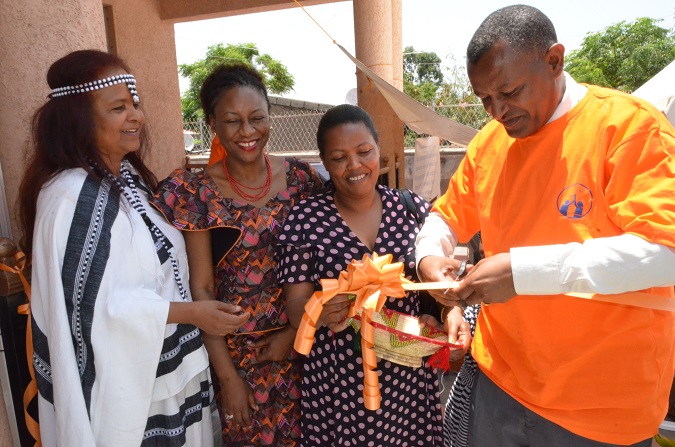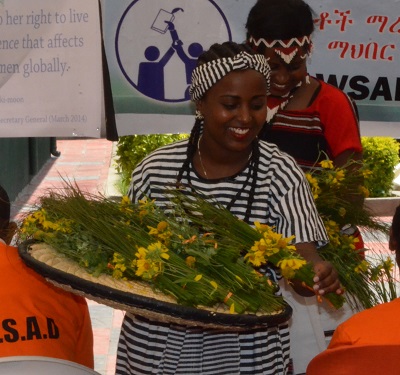
Deputy Police Commissioner of Oromia cutting the ribbon to the newly opened Safe House(Photo Credit UN Women)
3 September 2015, Oromia region, Ethiopia. About two hours from Ethiopia’s capital Addis Ababa, concrete steps to implement gender equality commitments and frameworks to end violence against women and girls are being taken. This week, these steps included the opening of a second Safe House for women and girls survivors of violence in Adama, Oromia Regional State. The safe house was officially opened in the presence of the Head of Oromia Bureau of Women, Children and Youth Affairs (BoWCYA), Deputy Police Commissioner, Oromia Police Commission, representatives from the Adama offices, embassies and UN agencies. The Safe House is another response to the need of providing safe spaces and services for women and girls survivors of violence and builds on an assessment undertaken in May 2015 targeting the police and women’s affairs offices which pointed out the need to enhance the response to VAWG in 6 identified zones the region. “We used to worry where to send the women but now we can refer them to the Safe House” states Ms. Alemshet Regassa , Deputy Manager, East Hararge Zone, Women and Children Affair’s Office. It is a chance for rehabilitation and an opportunity for survivors to reintegrate, states W/ro Hirut Birassa, Head of Oromia Bureau of Women, Children and Youth Affairs.

Celebrating the Opening of the new Safe House in Oromia with flowers (Photo credit : UN Women)
The newly opened Safe House in the Oromia region, makes it two Safe Houses that UN Women and partners are supporting to respond to the needs of survivors of violence, especially of sexual violence, some as young as 9 years old. “This is not just another programme we are supporting, this is our attempt to create alternative family structures for women, where they can feel safe, have voices, be able to participate fully in their personal as well as community development, and where we provide models to government on how to respond to survivors of violence”. Ms. Funmi Balogun, UN Women Deputy Representative to Ethiopia stated in her remarks. “It is also a different way to development which is not about high numbers but about turning the lives of individuals, with names, with stories, around in way that impacts on generations to come” she highlighted and applauded the commitment of the Government of Denmark in supporting this cause, especially since Safe Houses are not usually very attractive initiatives.
Ms. Maria Munir, Executive Director of the Association for Women’s Sanctuary and Development (AWSAD) stressed that Safe Houses are much more than beds and food for women and girls survivors. Safe Houses according to her, ‘take a lot of work, efforts and commitments – from supporting women and girls who come in and are often suicidal, rejected by their families to build their self-esteem back, to providing them with economic opportunities and skills, to the numerous follow ups for medical and psychological support, working with the Police and health officials to preserve evidence and numerous visits to courts to often get justice”. These are kinds of support that cannot be quantified.
The number of safe houses in Ethiopia continues to increase, and to date seven of them are availing safe spaces and services to survivors of violence. “If we work together crimes will not have a place and our children will be protected” the Deputy Police Commissioner, Ato Abebe Legesse, highlighted and reminded the need to create safe and peaceful environments that can prevent violence. “Change should start within our families” he stated underscoring the role of the family as being the natural safe space for women and men, girls and boys.

